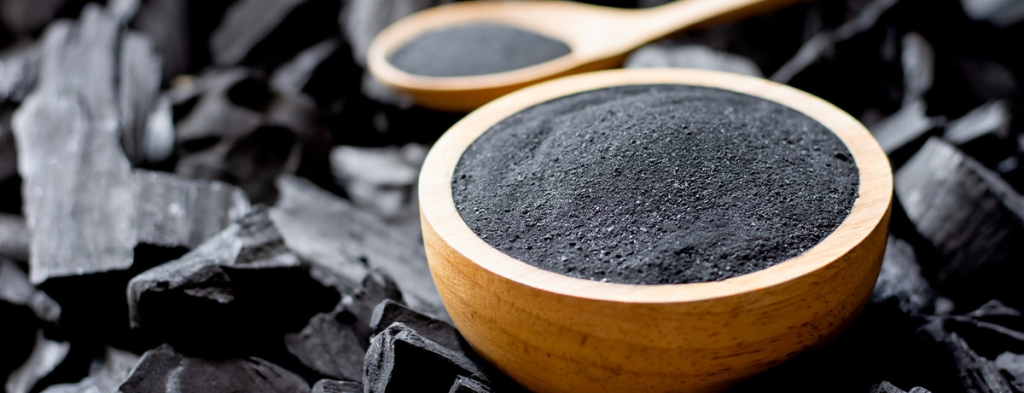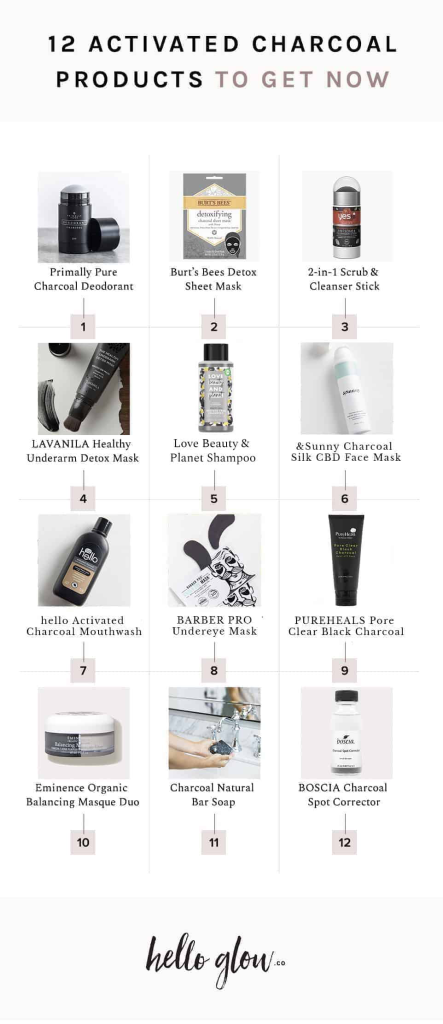Introduction to Activated Charcoal

[Source:hollandandbarrett.com]
What Is Activated Charcoal?
If you’ve noticed the rising popularity of black-colored products in health stores, you’re witnessing the activated charcoal revolution. This fascinating substance has quite a history – it’s been a trusted remedy since ancient times, serving as a versatile solution for various health concerns [#1].
Unlike the charcoal you’d use for your backyard barbecue, activated charcoal undergoes a special transformation. It’s created through a process where regular charcoal is exposed to oxygen at extremely high temperatures, resulting in a highly porous structure . Think of it as turning a simple sponge into a super-absorbent powerhouse.
How Does Activated Charcoal Work?
The magic of activated charcoal lies in its incredible absorption capabilities. Picture millions of tiny pores working like microscopic magnets, attracting and trapping unwanted substances. This remarkable property makes it particularly effective at binding with toxins and chemicals in your body.
An interesting fact worth noting is that activated charcoal isn’t something you’ll find in your regular diet – it’s exclusively a manufactured supplement designed for specific purposes [#2]. Similar to how green tea acts as a natural detoxifier, activated charcoal serves as a powerful cleansing agent, though through different mechanisms.
The applications of activated charcoal extend far beyond basic supplementation. From emergency medical treatments to beauty products, this versatile substance has earned its place in both clinical settings and everyday wellness routines. Just as coconut oil has found its way into various aspects of health and beauty, activated charcoal continues to surprise us with its wide-ranging benefits.
Health Benefits and Uses

[Source: amymyersmd.com]
Emergency Poison Treatment
One of the most vital applications of activated charcoal is its role in emergency medical situations. Medical professionals regularly use this substance as a first-line treatment for certain types of poisoning and drug overdoses. The reason? Activated charcoal can bind to toxins and chemicals in the gut, preventing them from being absorbed into the body [#3].
Promoting Kidney Function
Your kidneys work tirelessly to filter waste from your body. Activated charcoal may help lighten their load by reducing the number of waste products these organs need to filter . This support can be particularly beneficial for individuals dealing with kidney-related concerns.
Digestive Health Support
If you struggle with digestive discomfort, activated charcoal might offer some relief. It can help alleviate gas and bloating by binding to elements in food that trigger these uncomfortable symptoms [#4]. Much like natural remedies for water retention, activated charcoal works by addressing the root cause of these digestive issues.
Cholesterol Management
Research suggests that activated charcoal may play a role in managing cholesterol levels. Similar to how certain hormones influence body weight, activated charcoal can impact how your body processes cholesterol . While not a replacement for prescribed medications, it might serve as a complementary approach to maintaining healthy cholesterol levels.
- Binds to cholesterol during digestion
- Helps prevent cholesterol absorption
- May support overall heart health
Cosmetic and Household Applications

[Source: helloglow.co]
Teeth Whitening
Looking for a natural approach to brighten your smile? Activated charcoal has gained popularity as a teeth-whitening agent. The substance works by adsorbing surface stains from coffee, tea, wine, and other compounds that discolor teeth . While results vary among individuals, many people report noticeable improvements after regular use.
Water Filtration
Clean water is essential for health, and activated charcoal plays a crucial role in water purification. Many household water filters incorporate this powerful substance to remove unwanted elements from drinking water . The porous structure of activated charcoal traps various contaminants, including:
- Chlorine and chloramine
- Heavy metals
- Organic compounds
- Unpleasant odors
Skin and Body Care
Activated charcoal has become a staple in skincare routines worldwide. Its remarkable ability to draw out impurities makes it particularly effective for various skin concerns . From face masks to body scrubs, this versatile ingredient can:
- Help manage acne breakouts
- Soothe insect bites and minor skin irritations
- Control excess oil production
- Deep clean pores
Anti-Aging Benefits
The detoxifying properties of activated charcoal extend to anti-aging applications. By removing environmental toxins and free radicals from the skin surface, it helps maintain a clearer, more youthful complexion. Regular use in facial masks or cleansers may contribute to improved skin texture and reduced signs of aging.
Safety and Dosage Considerations

[Source: sciencedirect.com]
Is Activated Charcoal Safe?
While activated charcoal has numerous benefits, understanding its safety profile is crucial. Research indicates that activated charcoal is generally well-tolerated, with adverse reactions occurring infrequently . However, like any supplement, it requires proper usage and awareness of potential side effects.
Who Should Not Use Activated Charcoal?
Several groups should exercise caution or avoid activated charcoal completely. Medical professionals advise against its use for individuals with specific health conditions . These include people with:
- Risk of intestinal bleeding
- Intestinal perforations
- Digestive slowdown
- Bowel blockages
Activated Charcoal Dosages
Proper dosing depends on the intended use and individual factors such as age, weight, and overall health status. Before starting any activated charcoal regimen, consulting with a healthcare provider can help determine the appropriate amount for your specific needs. Similar to other dietary supplements, following basic safety practices helps minimize potential risks.
Risks of Taking Activated Charcoal
While generally considered safe, activated charcoal may cause certain side effects. The most commonly reported issue is vomiting . Additional considerations include:
- Potential interference with medication absorption
- Black stools during usage
- Temporary constipation
- Possible dehydration
Frequently Asked Questions
Difference Between Activated Charcoal and Activated Carbon
Many people wonder about the distinction between activated charcoal and activated carbon. In reality, these terms refer to the same substance – a processed form of carbon treated with oxygen to create countless tiny pores. The main difference lies in marketing terminology, where activated charcoal typically refers to products for medical or personal use, while activated carbon often describes industrial applications.
Common Uses of Activated Charcoal
While activated charcoal has gained popularity for various applications, its effectiveness varies significantly. The World Health Organization recognizes it as an essential medicine for treating specific types of poisoning . However, contrary to popular belief, it cannot treat all toxic substances. For instance, it proves ineffective against corrosive chemicals, strong acids, petroleum products, and heavy metals .
Shelf Life and Expiry
Activated charcoal maintains its effectiveness indefinitely when stored properly in a sealed container away from moisture and direct sunlight. Much like answering important health questions before starting a new treatment, understanding storage requirements helps maintain its potency. The key factors affecting its longevity include:
- Exposure to moisture
- Storage temperature
- Container integrity
- Environmental contaminants
Food Grade and Consumption
Food-grade activated charcoal meets specific purity standards for safe consumption. Despite its popularity in detox drinks and hangover remedies, scientific evidence shows it does not prevent or treat hangovers . When consuming activated charcoal, consider these points:
- Always choose food-grade products for internal use
- Take it between meals to avoid nutrient absorption interference
- Follow recommended dosage guidelines
- Store in a cool, dry place
Conclusion
Final Takeaways
Activated charcoal stands as a remarkable substance with multiple applications in health and wellness. From its life-saving role in emergency poison treatment to its practical uses in water filtration and oral care, this versatile compound offers significant benefits when used correctly.
While activated charcoal has gained popularity in wellness circles, its applications should be approached with knowledge and caution. Remember these key points:
- Medical supervision is essential for emergency treatments
- Timing matters – take it separately from medications or supplements
- Not all claims about activated charcoal are backed by science
- Quality and food-grade standards are crucial for safe consumption
For those interested in natural health solutions and looking to maintain a balanced lifestyle, activated charcoal can be a valuable addition to your wellness toolkit. Just as finding alternative approaches to fitness and health management can lead to better results, incorporating activated charcoal thoughtfully into your routine may provide notable benefits.
Stay informed about proper usage guidelines, potential interactions, and safety considerations. While activated charcoal offers impressive benefits, its effectiveness depends on appropriate application and understanding its limitations. By following evidence-based recommendations and consulting healthcare providers when needed, you can maximize its potential while maintaining safety.